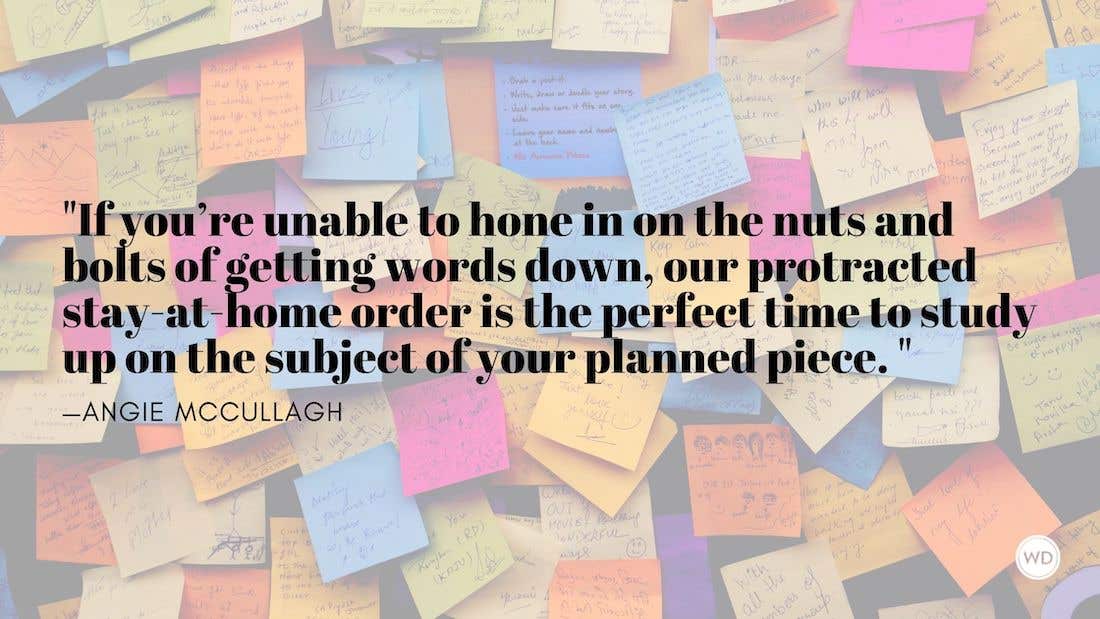9 Ways to Get the Most Out of Your Writing Residency
Regardless of your type of residency, it is important to use your time wisely. Here are 9 things to keep in mind.
Are you staring out the window, daydreaming of an isolated cabin in the woods where you have no other obligation to the world other than to wake up and write every day? If so, you’re in dire need of a writing residency. Every residency is unique. Some are rural, some are urban. Some allow for various social opportunities, while others give you a space and leave you alone. The application process from submission to acceptance to actual arrival can take anywhere from six months to a year, so you need to plan ahead. If you just started a novel and are hoping to retreat in time to edit it or you know you’ll have one week off in April to start putting together your poetry collection, start researching residencies long beforehand. And if life and money allow, you can shape your own writing residency. Rent a cabin and turn off your phone. Regardless of your type of residency, it is important to use your time wisely.
This guest post is by Johanna DeBiase. DeBiase is a freelance writer and the author of the fabulist novella Mama & the Hungry Hole (Wordcraft of Oregon, 2015). She earned her MFA in Creative Writing from Goddard College and her fiction and essays have been published in journals, magazines and websites. She has received scholarships to attend the San Miguel Writer's Conference and the Vermont Studio Center and a spot at the Rensing Center.
Follow her on Twitter @JohannaDeBiase.
1. Have a plan.
How detailed your plan is or how much you want to stick with it is up to you, but it helps to have an idea beforehand of what you want to accomplish during your residency. It doesn’t have to be only one thing, though it might be. Maybe you want to finish your novel, put together a short story collection or write five essays. Without a plan, you run the risk of accomplishing very little. You might end your residency with nothing to show for it, having scattered yourself in too many directions. Be realistic about what you are capable of completing during this fixed period of time and don’t get frustrated if you can’t do it all.
2. Be prepared to work.
The residency in and of itself is about work. Creative writers don’t often make a living from their writing, so they have to have a supplementary income. A residency allows you to take a break from your employment to work on your writing. If you want to do a residency where you don’t plan to work, where you plan to do nothing but walk in the fields and read books and let inspiration come to you, well, this might better be referred to as a vacation. If someone offers you a free place to stay because you are a great writer, then you can pay it forward by spending that time creating great writing.
3. Don’t put too much pressure on yourself.
All that said, it is great to take some time to relax, to read and to take long walks that conjure the muse. Allow for these empty spaces too. Don’t get discouraged because you have only this allotted time to write something brilliant. Putting too much pressure on yourself might actually backfire and create unproductive frustration (or writer’s block, if you believe in that kind of thing). Do the work, good or bad. Most importantly, enjoy the fact that you have no other responsibilities at this time to do anything but write. What you write is not as important.
4. Read a lot.
A writing residency is also a great time to get a lot of reading in that you might not have as much time for at home. Reading is just as much a part of writing as typing away at your keyboard or scribbling in your notebook. Bring books or e-books that are relevant to what you are working on. If you get stuck with your writing, try writing a critical review of what you are reading. Take notes about what you like or don’t like and whether it works or doesn’t work. Often, this will serve to move your own writing forward.
5. Stay active.
Take your exercise routine with you. Here is your chance to sit at a desk all day writing, but your eyes, joints, and muscles are all going to start aching for some action. If you’re a gym rat, consider jogging or bringing water weights with you. I like long walks and sweaty yoga. When I’m on a residency, I can get even more exercise than at home because I have no time constraints in my day.
Need an idea for a short story or novel? Look no further than
The Writer's Idea Thesaurus. Organized by subject, theme and situation categories,
it's the perfect writing reference to break out out of any writing funk.
Order now from our shop and get a discount!
6. Stock up on what fuels you.
If you like to reward yourself with chocolate, whiskey, or cheese, make sure to have them on hand. This is not the time to be an aesthete; that might be a different residency. Additionally, if you are inspired by doing another creative art form such as music or painting, make sure to bring your supplies for that too. I like to bring coffee, wine and watercolors. Sometimes these things are provided for you, especially coffee, but sometimes they’re not always available. It’s better to be prepared and to have what you need on hand.
7. Journal about your experience at the residency.
Taking time to reflect on your experiences at the residency, the work you are doing or the place you are in, is a great way to fully ingest and give meaning to your time there. You don’t have to be stuck in your head the whole time. Open up and see what’s around you. If your residency is in another part of the country or world, you can write about the local ecology or culture. As a writer, writing about your experiences is how you live them, so don’t forget to spend time appreciating your retreat. If it moves you to do so, you can use these free writes or journal entries to blog about your experience and share it with friends, family or fellow writers.
8. Meet other residents.
Most of the time, there are other residents, but not always. Sometimes you have many opportunities to talk to them and see/hear their work, sometimes not at all. Taking the time to meet the other writers in residence and learn about what they are working on can be very inspiring for your own work. Not only that, but it is a means of strengthening your global writing community. Many residencies have artists and writers together. I have learned that artists have a very different process than writers and are great at talking about their work and ideas. Sometimes, you can watch them in action doing their thing (much more interesting than watching a writer). Being open to these opportunities is a significant part of what a residency is about, meeting and sharing ideas and passion for the arts
9. Be protective of your time.
That said, it is best not to get too caught up with the social aspect of your residency. Artists are very respectful of other artists’ time. If you say you need to get back to work, they will nod with understanding and remember that they need to get back to work as well. If necessary, tune out your online community. Checking Facebook and Twitter might become too great a distraction. Your work must take priority, so covet your time like a precious gift because that is what has been given to you, a precious gift of time for your creative work.
Other writing/publishing articles & links for you:
- Here are 4 things to consider when researching literary agents.
What are overused openings in fantasy, sci-fi, romance and crime novels?
- What to write in the BIO section of your query letter.
- Here are 7 reasons writing a novel makes you awesome.
- New Agent Alerts: Click here to find agents who are currently seeking writers.
- Download a year's worth of writing prompts right here.
Thanks for visiting The Writer's Dig blog. For more great writing advice, click here.
Brian A. Klems is the editor of this blog, online editor of Writer's Digest and author of the popular gift bookOh Boy, You're Having a Girl: A Dad's Survival Guide to Raising Daughters.
Follow Brian on Twitter: @BrianKlems
Sign up for Brian's free Writer's Digest eNewsletter: WD Newsletter
Brian A. Klems is the former Senior Online Editor of Writer’s Digest, and author of Oh Boy, You’re Having a Girl (Adams Media/Simon & Schuster). Follow him on Twitter @BrianKlems.









